When I think of how The Witcher 3 depicts women, handles sexism, and deals with other hot-button subject matter, I think of one quest: The Bloody Baron.
Here’s the setup: Geralt of Rivia (the character you play) is searching for his lost adopted daughter, a woman named Ciri. Turns out she spent some time with a jumped-up warlord named Philip Strenger, who goes by the moniker “The Bloody Baron”. Strenger has an idea of where Ciri has gone. Before he’ll tell Geralt, he makes Geralt help him track down his wife and daughter, who he claims have gone missing.
And here’s what happens (spoilers, obviously): At first, Geralt thinks he’s dealing with a monster or some other ne’erdowell of the spooky and diabolical variety. But as it turns out, the Baron’s family didn’t just up and disappear. They left because the Baron was physically and emotionally abusive. As he eventually tells it, he went away to fight in the war, and he came back changed. He’d get drunk and beat his wife, punch and kick and yell until he fell into a dark sleep. It reached a turning point when he discovered that his wife, Anna, had been having an affair, and murdered her lover. Anna subsequently became pregnant, and one night he beat her so badly that she miscarried. Anna and their daughter, Tamara, finally fled, with no intention of ever returning.
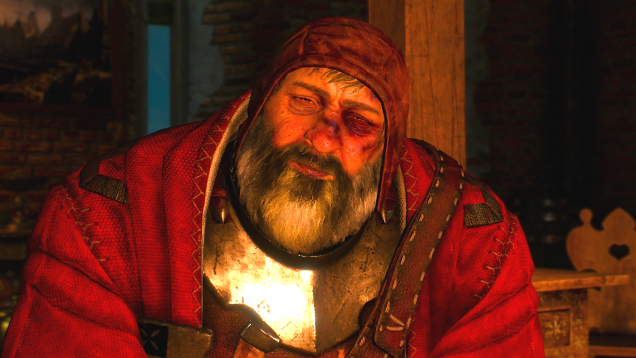
The horrifying full story emerges only gradually, as Geralt pokes holes in the Baron’s initial version of events. It’s a shock on multiple levels, and one that does not cast the Baron in a favourable light. As Geralt, you can choose to relentlessly punish him for it, both physically and verbally. In my game, I reminded him at every turn that he’d done a despicable thing. I never let him feel like he was absolved of his sins just because he regretted them.
After a subplot where Geralt discovers that the Baron and Anna’s miscarried foetus has returned from the dead as a supernatural creature — yes, that actually happens — Geralt finds the Baron’s daughter. There isn’t even a choice to divulge her exact location to her father. Geralt respects her wish to not be reunited with him, and that’s that.
Geralt also finds the Baron’s wife Anna, and her story is revealed to be even more complicated than it seemed. Pregnant and unhappy in a loveless and abusive marriage, Anna made a deal with three powerful witches to give them a year of her service in exchange for them magically “freeing” her of her unwanted child. She miscarried because of their dark magic, not because of the Baron’s fists. This is where the story lost focus for me — the thrust of the tale eventually gets lost in monster hunting and larger supernatural goings-on. A lack of focus ultimately hurts what could’ve been an even better, more meaningful story. Still, there’s never a question that the Baron’s awfulness drove Anna to take the drastic actions she took.
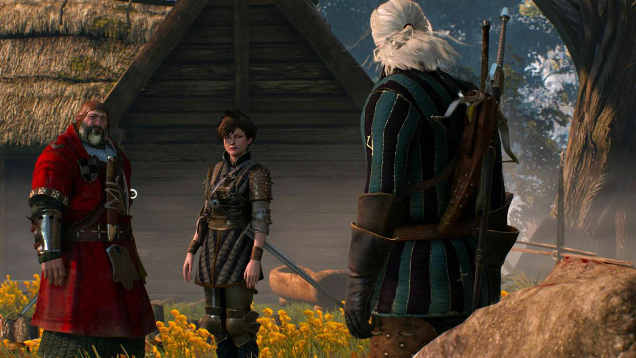
The Bloody Baron questline does not portray the Baron as a villainous madman. He’s an arsehole, sure, but he’s in turns compassionate and remorseful. He seems to be alcoholic, and his excuses for his horrible actions are often pathetic. He knows he fucked up. He wants to make up for it. His wife and daughter, on the other hand, think he waited way too long to turn that corner, and they don’t trust him. Why should they? They just want to move on with their lives.
The Strenger family’s story — an admittedly tiny fraction of a colossal game — has two possible endings: sad, or the most depressing thing you can imagine. Even in its darkest moments it remains thoughtful and treats its characters like people with realistic motivations.
The Bloody Baron quest represents a big, daring creative decision. Honestly, it’s hard to read over a recap and believe all of that made it into a modern, big-budget game. At times, it’s even hard to believe it’s in The Witcher 3. That’s because — while often brilliant in its handling of sex, women characters, and even sexism — it’s a game frequently at odds with itself. It’s been called out for depicting a fantasy world where women are treated poorly to up its surface level edginess factor, even as others have praised it for confronting real-world issues, offering players a mirror upon which to view actual problems. It’s even been praised as a feminist game. Of course Witcher 3 has caused arguments between players. It sometimes feels like it’s arguing with itself.
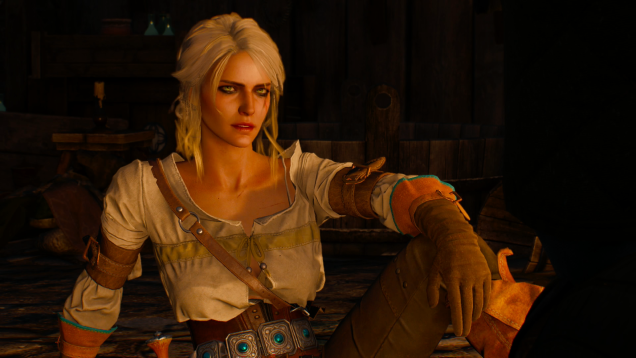
The Witcher 3 takes place in a fantasy world that draws on European history. It’s rooted in Slavic mythology and tradition as well as bits and scraps from countless other cultures’ folklore (Greek, Hebrew, even a bit of Japanese). It’s also a manly man’s world, not unlike, say, Game of Thrones. Women in the game are used, abused, and pigeonholed into “traditional” roles just for, well, being women — sometimes to a point where it started to wear on me as a player.
This is where examining The Witcher 3 gets tricky. Many characters in the game use insults and violence against women (or even corpses of women and sex workers) to paint the game world in shades of bloody red. Men are subjected to horrific violence as well, but in my 40 hours with the game, sexual violence and threats have been largely targeted at women. That aspect of the game sometimes feels juvenile, purposeless. It comes across as cruise control for “edginess.”
The Witcher 3 does occasionally call out the sexism inherent to its world. In those moments, it feels well thought-out, reflective on the imbalances many of its characters face in their day-to-day lives. Consider the “Master Armorer” sidequest. In it, Geralt is looking for someone who can make mastercrafted armour, the best class of armour in the game. His search leads him to a smith who looks every bit the clichéd fantasy armorer: a bearded dwarf named Feargus. However, as Geralt sets about finding Feargus the tools he needs to make top-tier armour, it becomes clear that Feargus has actually been taking credit for a woman’s work his whole career.
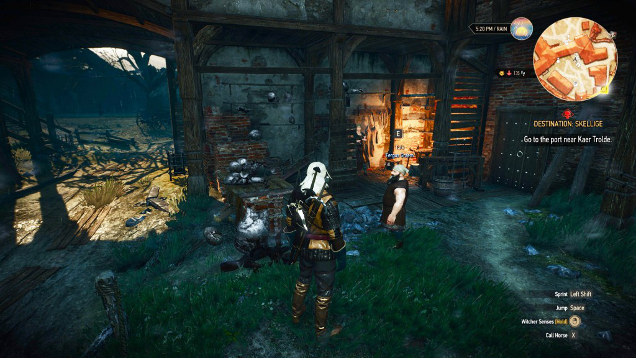
The woman, Yonna, had been posing as Feargus’ assistant. She confesses to Geralt that she’s sick of the sham and decides she wants to make something herself, without her pesky pimple of a middleman. After you collect some supplies for her, Yonna and Feargus have an “armour-off” in which her armour proves far superior. It’s a public humiliation for Feargus, and even the soldiers Yonna and Feargus are working for can’t deny she’s the better smith. It’s an interesting usage of the sexism that’s so often present in The Witcher 3‘s world — and one that, once again, confronts a real world issue (women not being taken seriously in the workplace) and calls it out for being shitty.
For every time The Witcher 3 hits the nail on the head, however, there’s another instance where it’s comically clumsy. Let me just say: I like that The Witcher 3 is so sexy. I think it’s awesome that Geralt is a sexy dude who does sexy things with sexy ladies. It’s fun. It’s a free, open approach to sex that you don’t see in the Mass Effects of the world, where sex is a deal-sealer, a legally binding contract you sign, usually near the end of the game, when you enter into A Relationship with another character.
I also like that, in some cases, some women in The Witcher 3‘s world are in full command of their sexuality. Sorceresses use Geralt for sex just as often as he uses them. Sometimes it blows up into a bigger thing, sometimes it’s just, “We fucked. OK, cool. Later!”
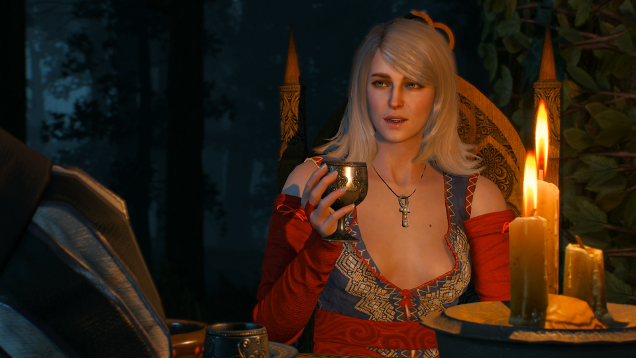
Some of the game’s main women characters get interesting, well thought-out character arcs, others are glorified eye candy. Regardless, their outfits are often designed for lusty, probing eyes. The game wants you to undress characters like Yen and Triss and Keira in your mind long before Geralt ever does it with his hands. And, sure, I get it: they’re sexy ladies, and they know it. They’re not afraid to use that side of themselves to tip the scales of an otherwise bullshit world in their favour. I definitely do not object to that.
The game just overdoes it. Let’s use Keira as an example. She’s a sorceress Geralt ends up questing with to find Ciri. They hit it off pretty well. But from the moment you meet her, she’s wearing this outfit that looks like it belongs on a porn set. It’s hilariously impractical, allowing her nipples to oh-so-slyly peek out from the right camera angles.
Even in serious scenes, I couldn’t stop wondering, “OK, when is the cheesy saxophone music gonna start playing? When is Geralt gonna be like, ‘Let me help you out of that silly thing. And here are my sexy friends Roach and The Wild Hunt for a foursom — [TURN BACK, TURN BACK, THIS HAS GONE TOO FAR].” It works fine when The Witcher 3 is embracing its lovingly schlocky, romance-novel-cover vibe, but when things get serious or dramatic, it can be a distraction.
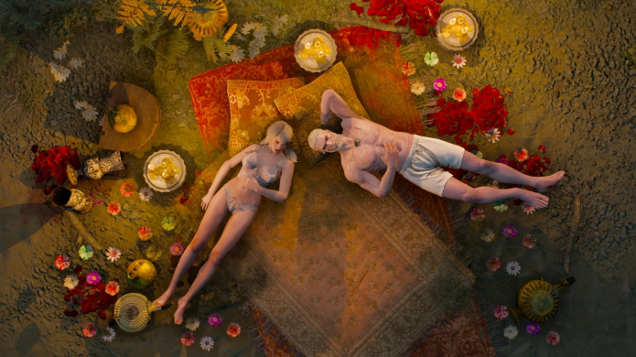
Keira remains an excellent character. She has interesting motives and goals, and she plays Geralt like a fiddle, romancing him (instead of the other way around) in a way that feels both sincere and manipulative. It’s a really cool dynamic, and it left me feeling conflicted about her afterward. She manages to by sly, attractive, and — unlike many video game characters — believably sexy despite the peep-show attire, not because of it.
Another example: Ciri’s outfit, which always reveals a bit of her bra, tantalising you even though she’s basically Geralt’s daughter. She is another intriguing, well-written character — one of the game’s best — but aaaaaaa, weird boner. Poorly timed boner. Wrong boner. When my girlfriend watches me play, she likes to find creative ways to work nipples into characters’ conversations:
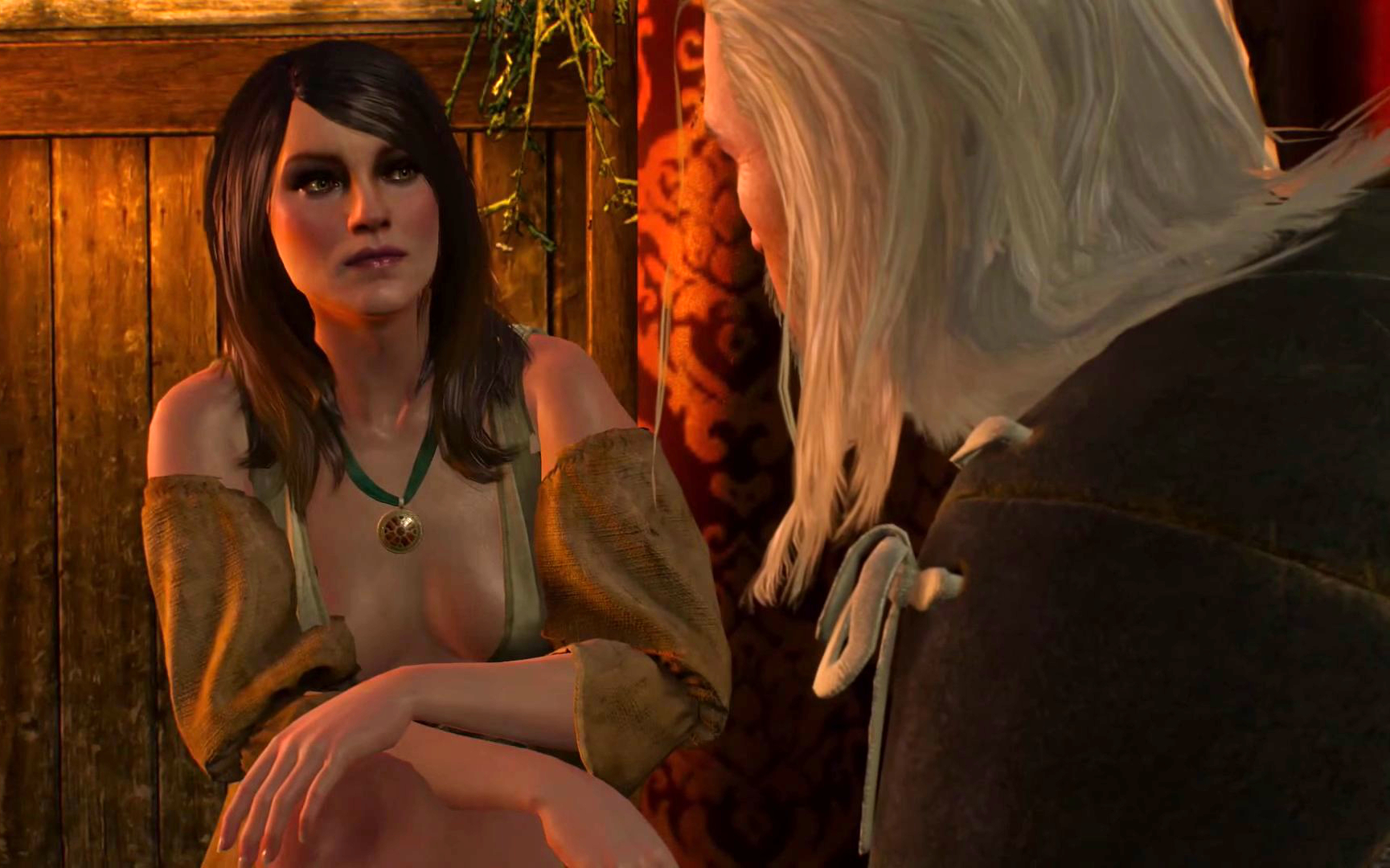
Geralt to the woman pictured below: “How do Dreamers work? How do you see people’s pasts?” My girlfriend: “And how do your nipples stay in your shirt?”
Is it funny? Absolutely. Does that outfit “offend” me? Nah. Does it distract me from the dramatic impact of what is by and large a well-written, interesting story? Yeah.
Despite the ways it turned me off, I appreciate what The Witcher 3 tries to do. I do not believe it always succeeds but as I said earlier, it goes for it. The game’s creators want to give their players something to think about. This game contains a main story quest that explores domestic abuse, miscarriage, and has a (surprisingly emotional!) monster-foetus twist; it’s a game where characters treat sex with refreshing frankness even as they get involved in outlandish sexual scenarios. The Witcher 3 is unusually unafraid to tackle subjects other games would gloss over by leaning on tropes or by pretending those issues don’t exist.
Last fall’s Dragon Age: Inquisition provides an interesting counterpoint to The Witcher 3. BioWare’s game still challenges its audience, but in a different, almost directly opposing way. Inquisition tests preconceived notions by depicting a world in which currently contentious subjects — for instance, trans characters and gay characters — are accepted, not squabbled over. That’s awesome, and I’m glad there are games that let people of all types be who they want to be without ugly prejudices spitting all over their parade.
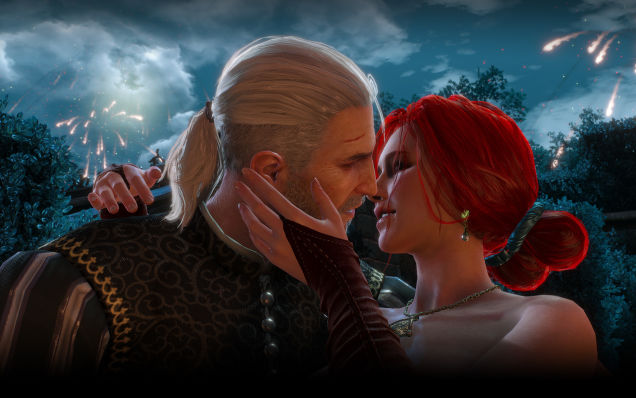
The Witcher 3‘s approach is more direct. CD Projekt Red’s game stares down problems — it attempts to depict things as they are rather than sugarcoating them. To interrogate, dissect, and understand. That approach can create a space for reflection, discussion, and growth. Both games are valid. Could a game more directly focused on those issues untangle them better than The Witcher? Probably. Games have only scratched the surface of this sort of subject matter, and I hope they continue to explore it. Who knows? Maybe another Witcher game will do it even better.
During the search for the Baron’s wife and daughter, I came across a family who’d given the Baron’s daughter, Tamara, shelter. In the telling, the man of the house went to great lengths to say that his wife was the only reason they’d taken Tamara in and protected her. He confesses to Geralt that he was a coward, said that his wife was braver, wiser, and better. As he talks, his wife stands in the corner, silent, perhaps worried that Geralt is going to rat them out to the Baron. There it was, a brief moment of characterisation that didn’t need to happen. It was just there, and it said a lot about this woman’s lot in life.
Picture: Mathiasus
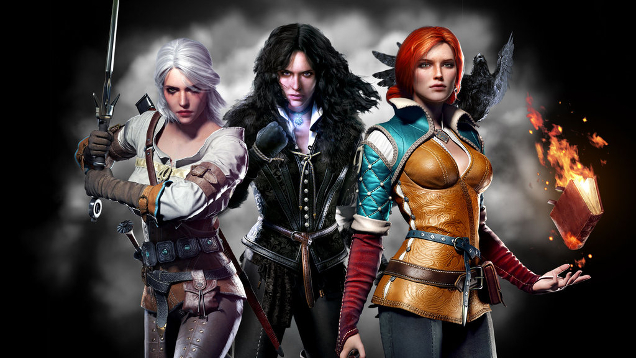
Comments
21 responses to “The Complex Women Of The Witcher 3”
the whole Baron quest shows what truly is brilliant about this game. It tried to look at a very serious topic from all sides (and yes I know there will be some who dont want to hear the Barons side of it). Mores the pity. At no point was I happy with his actions nor did I feel any remorse to him that disnt mean I wasnt capable of listening to his side free of judgement.
The only part of the whole quest I didnt like was that there didnt seem to be an option in which I couldnt tell him where his daughter was. (did I miss it?) I didnt want to tell him what I found out about his daughter so I went and saw her where she was first. Expecting that when I returned to him I would be given a choice to withhold the location from him. Sadly it wasnt. That was one of the very few times I felt the writers missed a trick. Like i said this is a huge game, maybe I missed it?
Anna didn’t have an affair because he was beating her. She did while he was away at war. He specifically says the very first time he ever hit her was when she was in hysterics after he killed her lover.
It doesn’t absolve him of anything or makes him less of an asshole but it does frame the situation very differently, a broken and toxic relationship from all angles. Phillip wasn’t innocent but neither was Anna and that greyness where no one was right was the whole point of the storyline. Supposed to feel sympathy for no one and everyone at the same time and be uncomfortable with it all.
heh i just made a post about that below – thats how i remember it too. Whilst it’s no excuse for the violence it did make me really emphasize with him in relation to just how angry or hurt he was. It is a huge deal imo if he was just a drunken wife beater you’d write him off entirely.
Spoilers blahblah
Was that indeed the way it occurred – i could have sworn he didn’t hit his wife until after he snapped and killed the guy she was cheating on him with (she started the affair whilst he was away fighting). After that she goaded him continuously which lead to the beatings as he put it.
I wonder if the story he tells is slightly different depending on dialog choices. Then again i might be remembering it wrong – kinda zoomed through the baron quest line as it was so engaging.
This is wrong. Anna initiated the miscarriage by going to the crones and drinking some potion. He didn’t cause the miscarriage at all (well physically). At least i don’t think so lol there was something about an amulet the pell dude made which was protecting Anna or the child – FARK i can’t remember hah.
I can’t remember mention of Anna drinking a potion for the miscarriage, but maybe I wasn’t paying attention. As such, my interpretation was that the Crones agreed to Anna’s wishes, but in their devious ways caused her miscarriage at the Baron’s hands, which would make the whole situation even shittier. As I said, though, I could be entirely wrong.
I understood it like you and not like how the article puts it too. Which makes it even better as the Baron is harder to hate and pin as a complete ‘bad guy’.
He effectively broke down due to both the war and also what Anna did behind his back given that he said he loved her at the time.
*Massive spoilers below*
Precisely. To me the article has completely missed just what made this quest line so emotionally investing and imo the best written quest\story in a game to date. Initially you just thought the baron (Philip) was a complete c*nt – wifebeater, no excuses. As the story fleshed out you couldn’t help but feel for him, even knowing what he did was terrible. Don’t misunderstand me what he did was wrong – very much so but you come to realize that this wasn’t just a one sided affair. Anna had as much responsibility as Philip did – heck it was her initial betrayal of the baron that started off the whole thing.
The baron had just come back from a presumably extremely violent war to find out his love of his life was cheating on him – he wanted to confront them but just saw red and ended up killing her lover. Anna reacted violently and she tried to kill him, she was frenzied, the only way he could restrain her was by being violent – hitting her. That event opened the can of worms. From here on everything just went from bad to worse. She goaded him into beating her (as he tells it) and this happened for years. Is it possible that Anna does it on purpose out of guilt? Maybe she feels like she got her lover killed and deserved some form of punishment?
Anna hates the baron she never forgave him for what he did to her lover. When she fell pregnant she went to the crones to get an abortion as she didn’t want another child from that ‘monster’. At some point she felt off, something was wrong with her so she went to the peller and got the amulet which slowed the curse the crones put on her.
Another domestic broke out (the scene Geralt investigates) and the amulet was removed this led to the eventual miscarriage. At this point their daughter stepped in and said enough is enough time to leave. Whilst leaving\escaping Velen the mark of the crones lights up and the fiend comes to take her away – her payment to the crones is due as the miscarriage\abortion had occurred.
—
That’s as much as i could piece together from various places.
Like The Cracks, I don’t remember mention of a potion, but I do remember the Baron saying something about feeling a darkness inside him, and I got the impression that the crones had used some spell to influence him.
Such a great article!
The Baron’s questline was definitely one of my favourites, and when I got to the end of it I wished I could have changed some of my actions and gotten a better outcome.
I also found Witcher 3 to be both feminist in ways, and also degrading in ways similar to GTA V, etc. in others. I know it’s a fantasy world, but is so much cleavage really necessary for powerful women like Keira and Ciri? I’m looking forward to future discussion of Witcher 3 as a feminist game, and hoping for the next instalment to focus on Ciri. Perhaps she could be the next gaming feminist icon? I hope so.
The funny thing about cleavage in these games is it’s powerful women who are trained to be skilled and powerful people. Power includes using assets effectively so cleavage especially in this world could be used to effectively empower the women as they’re definitely not victims but people in control.
I dunno about you but use my body as a method of control. Being a big guy you get peoples attention easier and being a smart guy I can also make them listen.
I don’t really hold the same perspective in a number of respects to this article but am so very refreshed to see gender issues and roles and their representation in media explored holistically. Thank you for writing such an insightful and interesting piece.
Thank you for articulating my thoughts on this too!
To be fair the game takes no time in undressing Kiera for you. You’re first conversation with her she’s naked in a magic hot tub.
Also Baron quest line is one of my favourites. My only issue was when I changed the tone from what’s describe about to OH MAN YOU PLAY GWENT?? GET YA DECK OUT BOY WE GONNA PLAY!!!
I never played Gwent with the Baron – if you miss it he leaves his unique card on a dresser which allows you to finish up that quest.
An interesting side effect of the Bloody Baron quest: one option at the end is to send the Baron and his wife off to an unspecified location to reconcile. If you do this, the sergeant takes over and basically starts running the place as a kleptocracy – rule by the bandits, without the attempts at legitimate rule towards long-term membership in Nilfgaard that the Baron had tried for.
So having the Baron put his personal life first screws over everybody else.
Spoilers for Baron quest endings.
If you don’t reconcile them, the Baron hangs himself and the sergeant still takes over.That’s how it went down for me.
Oh that’s cool. I’d assume they’d just fail the GWENT quest.
I think it is also important to note that the sorceresses are not just conveniently hot women – they were “corrected” whilst in training using magic to make them look the way that they do, whilst the mages had similar manipulations to make them look wise (generally meaning old and grey). These magic users were being raised to control the world and part of their training included using the assets of their gender.
I think this point is a perfect example the real world reflections the witcher likes to employ: when trying to gain the power of control and manipulation, women need to be young and attractive, men require age and wisdom.
I always found the crones really interesting – magic users who disguise themselves as young, attractive women in order to manipulate local villagers into worship. Are they really that different to people like Yen and Triss?
I get that some people dont like the scantily clad women in the game but if you’ve read the books that’s exactly how the author depicts the sorceresses. If anything CDPR have toned down how Sapkowski describes their clothes.
I am interested to know if Nathan thought the sexy dress is an distraction before or after his wife pointed them out. Only because I didn’t even pay attention to the dresses until my wife point them out to me.
I have noticed my wife and I focus our observation on different things. Just as one example (out of many): the other day we were just walking down the street and we both notice a very tall woman. I observed that the woman is tall and attractive. My wife however, observed that she is very skinny; she has good fashion sense and her bleach blond hair.
So back to the game, I never noticed the dress until my wife point it out to me when/if she watched me play. Could the sorceresses be wearing something more “practical”? Sure. But to me, sexy dress is not a distraction either.. until my wife mentioned it.
Typically, massive relevant point missed by Grayson. This is nothing new for the Witcher series. Its always been this way.Stop pretending they jumped on your bandwagon. You just ignored them until they were relevant to something you wanted to write about.